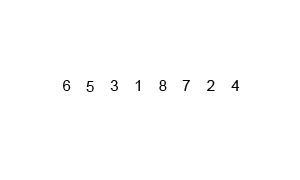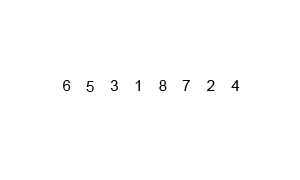1. Understanding Merge Sort
What is Merge Sort?
Merge Sort is an efficient, comparison-based sorting algorithm that uses a "divide and conquer" strategy. In simple terms, it repeatedly breaks down a list into several sub-lists until each sub-list contains only one item (which is considered sorted). Then, it merges those sub-lists back together in a sorted manner.
How Does it Work?
The process can be broken down into two main phases:
- Divide Phase: The main, unsorted list is recursively divided in half. This continues until all the resulting sub-lists have only one element.
- Conquer (Merge) Phase: Starting with the single-element lists, the algorithm repeatedly merges pairs of adjacent sub-lists. During each merge, it compares the elements from the two lists and combines them into a new, larger, sorted list. This continues until all the sub-lists have been merged back into a single, completely sorted list.
Visualization Explanation from the GIF
The GIF you provided is a perfect illustration of this "divide and conquer" method. Let's break it down step-by-step.
-
The Start: The animation begins with an unsorted list of numbers:
[6, 5, 3, 1, 8, 7, 2, 4]. -
The "Divide" Phase:
- First Split: The entire list is split into two halves:
[6, 5, 3, 1]and[8, 7, 2, 4]. - Second Split: Each of those halves is split again:
[6, 5],[3, 1]and[8, 7],[2, 4]. - Final Split: The splitting continues until we have eight separate lists, each containing just one number:
[6],[5],[3],[1],[8],[7],[2],[4]. At this point, the "divide" phase is complete. A list with one item is inherently sorted.
- First Split: The entire list is split into two halves:
-
The "Conquer (Merge)" Phase: Now, the algorithm starts merging these small lists back together in sorted order.
- First Merge: It merges adjacent pairs.
[5]and[6]are compared and merged to form[5, 6].[1]and[3]are merged to form[1, 3]. Similarly,[7, 8]and[2, 4]are created. We now have four sorted sub-lists:[5, 6],[1, 3],[7, 8], and[2, 4]. - Second Merge: The process repeats with these new, larger sorted lists.
[5, 6]and[1, 3]are merged. The algorithm compares the first element of each list (1vs5), takes the1, then compares3and5, takes the3
- First Merge: It merges adjacent pairs.


